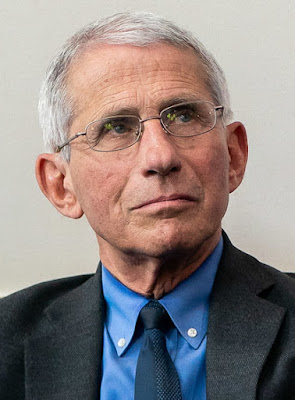Dr. Fauci discusses state of Covid-19, how variants surprise us and why herd immunity is a tough reach
"We always have to be on the lookout for a variant that might ... seriously evade protection from prior infection." - Dr. Fauci
Dr. Anthony Fauci, the nation's preeminent infectious disease expert, just spoke remotely for an hour with the National Press Club in Washington. He discussed issues such as his decision to forgo attending the White House Correspondents Dinner on Saturday, the speed of a toddler-friendly vaccine and how the insidious nature of SARS-CoV-2 variants is making herd immunity all but impossible.
"How we think of herd immunity is likely unattainable in Covid-19," Fauci said, in response to a question posed by Club President Jen Judson. "So I think we have to realize that. It was what we did with measles, what we did with polio. You had enough immunity in the population with a stable virus. That’s classical herd immunity. It makes it very problematic to get herd immunity, though, [with Covid] - meaning there is enough protection in a community and enough stability of the virus and durability of protection that you don’t have any infection in a community, similar to what you see now with measles and polio. Measles is widespread in many other countries, yet we don’t see it here becase people are immune to it and the virus doesn’t change."
Indeed, he pointed out, all one has to do to understand how this changing virus can affect us is to look at Delta and Omicron.
"If you would have said that you would have been knocked on your back by Delta and then knocked again by Omicron [you would/might have been surprised]. There are sublineages that may be two-to-five to 30 percent more transmissible, and that means [they] spread more rapidly. We always have to be on the lookout for a variant that might ... seriously evade protection from prior infection."
I was able to have a question asked during the event: "An issue many Americans are having is the idea of 'hybrid' work that only suits the employer's needs. For example, changing the days of the week one is forced to come into the office. How can American businesses better gauge employee risk?"
The doctor quipped that perhaps there was a question in there, but then said these were important points. "Yes there is a lot of hybrid work," Fauci said, "and employers should be aware of what they can do - that’s a good question - to mitigate risks in the workplace. One: have proper ventilation as well as proper spacing, and diminish the density of people to have staggered coming in – two or three days, if you have a workplace ammenable to virtual working. If you stagger the schedule you will have much less [transmission]."
Dr. Fauci also said employers should "pay prudent attention to testing, and employees should stay out of work if [they exhibit] any symptoms; and encourage employees to get vaccinated and boosted."
Judson asked Dr. Fauci questions pertaining to children, including why the virus behaves as it does in kids versus in adults.
“We don’t know," Fauci replied. "It doesn’t affect children as seriously as it affects adults, but to make the conclusion that it’s trivial in children [is not accurate]. We’ve had the inflammatory syndrome in children. We’ve had children die from this, be hospitalized. Though it’s true that children in general do not get as severe an outcome as a cohort as do elderly people, we should not downplay the seriousness in children. We don’t want to accept that it’s ok for children to be infected and get sick, it’s not."
As for why it is taking longer to get a vaccine approved for younger children, Fauci said the FDA is not purposely holding things up, that all the data must be thoughtfully reviewed, carefully reviewed. He pointed out that vaccine rates for children are low because, understandably, many parents have concerns about safety. They ask: "Does the risk/benefit [equation] weigh in favor of the benefit?
If you go over all the data, hopefully parents will come to the conclusion that it certainly is to the benefit of their children."
An interesting point Dr. Fauci made in general was that one should not question another's choices - such as attending or not attending an event - because we don't always know someone's personal risk. Age, for example, is an obvious risk factor but there are often many other considerations to take into account. Throughout the call, he talked about being sensitive to the immunocompromised - for example, people receiving chemotherapy or even those who are obese. On this topic, he also stressed the need to not only get vaccinated but also boosted.
As for masks, he spoke again about assessing personal risk, and said yes he would wear a mask on a plane.
PHOTO: By The White House from Washington, DC - White House Coronavirus Update Briefing, Public Domain.
The author has added more of Dr. Fauci's response to her question, as well as his comments about vaccines for children.




Comments
Post a Comment